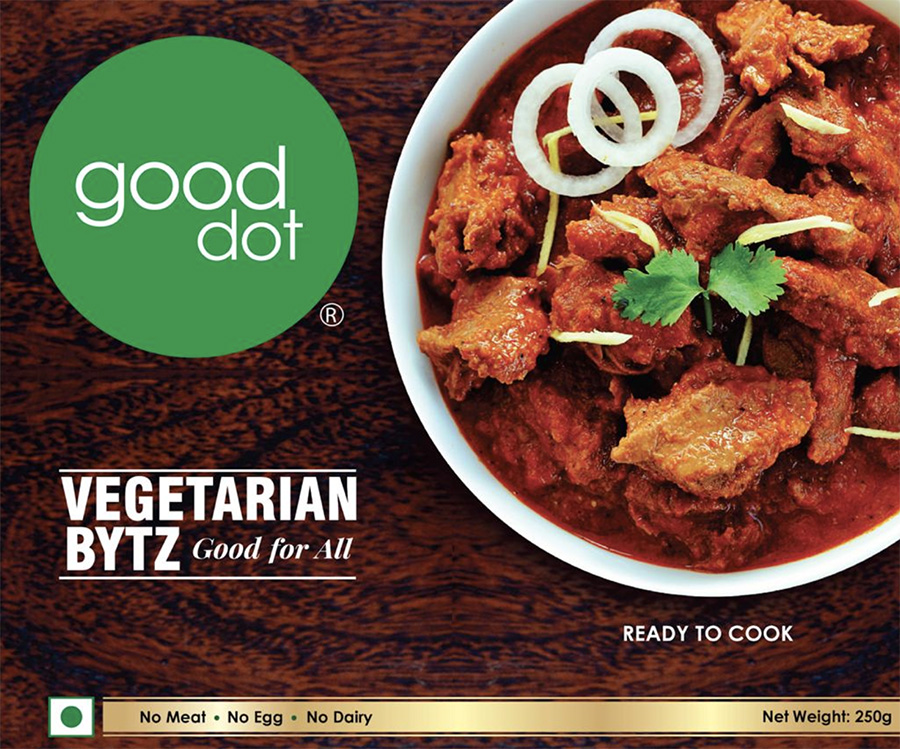May 15, 2020
Plant-based meat is catching on in the world’s top pulse consuming nation.


According to Euromonitor International, in 2019 the global plant-based meat sector’s retail sales hit $18.6 billion and is projected to see an annual growth rate of 6.7% through 2024. This phenomenal growth has made a big splash in the food industry press, with major players like Beyond Meat and Impossible Foods grabbing a good part of the headlines, especially as they have begun to expand into Asian markets.
But in the coveted Indian market, homegrown entrepreneurs are starting to make noise themselves. One of the country’s most widely recognized plant-based meat companies is GoodDot Enterprises. Founded in 2016 by a group of friends determined to make the world a more humane place for animals, its name refers to the practice of indicating vegetarian dishes with a green dot and meat dishes with a red dot on packaged Indian food products and restaurant food menus. The green dot, explains co-founder and CEO Abhishek Sinha, is the good dot. The company’s mission, he states, is to provide meat-eaters with high quality, plant-based alternatives that capture the taste and texture of animal-based meat, and thus reduce animal suffering, while also promoting healthy eating and sustainable food production.
In a country where beef is shunned for religious reasons and animal protein is generally not a big part of everyday meals, India may seem an unlikely market for plant-based meat products. But Abhishek points to a large-scale survey that found that only 28% of Indians identify as vegetarian, while 72% reported eating meat.
“And 72% of 1.3 billion people is a lot of customers,” he laughs. “It is true, though, that here in India we are not as intensive meat-eaters as people outside of India. Most of the consumers have a meal with meat only once or twice a week.”
Based in Udaipur in Rajasthan, the company is located strategically at the mid-point between Delhi and Mumbai, with easy highway access to both, and close to farmland where soybeans, an ingredient in some of their products, are grown.
In a telephone interview, Abhishek spoke to the GPC about his company’s growth and future plans, and about the potential for plant-based meat in India.

GPC: Tell us a little bit about your personal background and how it is you became involved with plant-based meat.
Abhishek: I have a bachelor’s degree in chemical engineering, and I have held various national government posts, but not as a chemical engineer, but rather on the financial side. For instance, I was the Deputy Commissioner of Income Tax with the Indian Revenue Service. I also have a post-graduate degree in taxation and business law.
My involvement with plant-based meat was serendipitous. One of the things that defined me as a person from the very beginning was my love for animals. I would care for stray animals, feed them and try to heal them, even taking them to the veterinarian when necessary.
At the same time, though, I come from a community where people eat meat. And I, too, ate meat. Therefore, there was always a moral dilemma in my mind; on the one hand, I was saving animals and on the other hand I was part of a system that kills them for food.
It was in 2003 in my final year of engineering study that I came across an article about the Dutch government supporting research on tissue cultured meat. I found that really exciting because it meant that there was a way to enjoy the taste and texture of meat without being instrumental in the killing of animals. I kept tabs on the segment as a sort of hobby, primarily from the point of view of being an eager future consumer of tissue cultured meat. But other than following the developments closely, nothing concrete happened.
Then in 2013, after trying (unsuccessfully) to give up meat for years, I finally decided that either I needed to accept that my craving for meat was more important to me than the life of an animal, or I had to stand up for something I believed in. That’s when I became a vegetarian and eventually a vegan.
Abhishek: In 2013, together with some like-minded friends, we formed a team and decided to take a look at some of the early plant-based meat products that were available then. These were products made by companies mainly in North America and Europe. There were some other products from South Africa and Southeast Asia also.
No company was manufacturing anything like that in India and the team felt that the potential for these products here was huge. We got some investors lined up, got some protein chemists, food technologists and flavoring experts onboard, and we started testing the available products, preparing dishes across different cuisines and ranking them.
From that research, we noticed three gaps that needed to be bridged if plant-based food were to succeed in India. First, we saw that some products did well in Oriental cooking, others in Continental cuisine, but very few did well in Indian style cooking. In India, meat is cooked for a longer time. And these products didn’t hold up. Second, most of the products were quite expensive and India is a price sensitive market. And third, these products were either frozen or needed refrigeration, and there are large areas of India, especially the rural and semi-urban parts, were a frozen supply chain would face significant logistical challenges.
So, we realized we needed something that did well in Indian cuisine, was affordable and had shelf-stability at room temperature. We focused on developing a product that filled those gaps, and three and a half years later we came up with something we were happy with. Our first product was a plant-based mutton (goat meat) replacement. Finally, the company GoodDot was founded in 2016, and we launched commercially at the end of 2017.
Abhishek: We have a variety of products with varying formulation mixes. We use pea protein in some of our products. We also use pulse flours. On the R&D side, we are working with some moong and other lentil proteins, but it is difficult to find extracted protein from these pulses in India. Nonetheless, we are getting some very encouraging results and are exploring these proteins extensively.
Abhishek: Our most popular products are Vegetarian Bytz and Proteiz. Vegetarian Bytz , a vegan mutton/lamb substitute, is a shelf-stable product at a price that is more affordable than mutton in India. The second is Proteiz, a dehydrated chunk, that can act as a chicken alternative in, for instance, Asian cuisine. It also acts like a scrambled egg in Indian style cooking. Very soon, we will be launching a premium chicken substitute.
Abhishek: It has been extremely positive. We get a lot of repeat customers. A lot of consumers have given up meat after trying our products. When cooked right, there is hardly any difference between these products and animal meat. Awareness of plant-based meat products is growing, but when we launched, there wasn’t much awareness at all. But in blind tastings and in focus groups, around 80% of consumers could not tell it was not animal meat. When we tell them it’s a vegan product, they are shocked!
Indians are very open to these products because vegetarian values are very much ingrained in India. Most of the diet here is comprised of vegetarian products. In fact, last year, several organizations including the Good Food Institute, carried out a large-scale survey and determined that India ranked highest, even above China, in terms of the consumer acceptance of plant-based products.
Abhishek: Until a few years ago, the plant-based meat segment was very small. The initial products in the market, though good, were not the best replacements for meat. Therefore, they catered to a niche segment. This was similar to the experience in the U.S., where mainstreaming of plant-based meat products has happened only in the past decade.
Now, with products like ours which resemble animal meat closely, the target consumer group has expanded to include meat eaters as well. The plant-based meat space in India is in the same position that it was in the U.S. three or four years back. There is a tremendous buzz about the category, and it is poised to explode in the next few years. The consumers are actively looking for more plant-based meat options in their diet.
At the corporate level, Beyond Meat’s blockbuster IPO in the U.S. has awakened major companies to the immense potential of this space. At GoodDot, we have been approached by large corporate groups operating in India that are interested in forming strategic partnerships. As a successful plant-based company in India, we have valuable technical expertise and market insights to offer. The market here is vastly different than in the U.S. or other places. The exact replication of models that work there won’t work here. We also built those experiences from the bottom of the pyramid in India, across all parts of the country, including small towns and villages. That gives us very valuable insight into consumer behavior, and a lot of encouragement as to the future of plant-based meat in this country.
While the per capita consumption of meat is quite low in India, it is increasing rapidly. We have an opportunity to help a large chunk of the population leapfrog to plant-based meats. As such, India has the potential to be one of the world's largest market for plant-based meat products.
Abhishek: When you set a benchmark, you find a way to achieve it. In India, a pricey product is going to have a niche market. It isn’t going to go mainstream. When we were setting up the company, we checked out the various technologies, the available equipment, the processes involved and the ingredient mix. Of course, India has an advantage in terms of lower labor and land costs, for instance. That also helps. But using the right technologies and correctly customizing machinery, we managed to reduce the loading of capex costs on the finished product.
Importantly, our goal is to end animal suffering. So, we prioritized volume and looked to operate on razor thin margins. We spent very little on marketing and creating awareness, because eventually those costs also need to be loaded onto the product. We bootstrapped ourselves so we could beat the limit defined by the cost of meat.
And it has worked out. Despite very limited spending on marketing, we have experienced extremely strong and consistent organic growth.
Abhishek: Right from the inception of GoodDot, our target has always been meat-eaters. There are two reasons for this. First, as I mentioned, our mission is to reduce the suffering footprint in the meat industry. If we can help meat-eaters reduce or preferably eliminate meat from their diets, we would have fulfilled our purpose. Second, meat-eaters have an easier acceptance to plant-based meat because they have a reference point in terms of taste and texture. They know what meat tastes like and if we can match or come close to that, I think they will appreciate the product.
With vegetarians, we had a surprising experience. Initially, a lot of them are scared or just refuse to try our products. Those who do eventually become extremely loyal customers because they get this feeling of satiation that comes from eating a highly protein dense product. That’s why lentils are so popular in India. They leave you feeling full. Vegetarians always have dal or a pulse-based dish with their meal because it completes the meal. Our products play that role, but you have to convince vegetarians to give them a shot.
Abhishek: GoodDO is our sister company. It came about because, initially, when we rolled out our base products, the vegetarian mutton and the dehydrated chunks, we received 70 to 75% extremely positive reviews and 20 to 25% negative reviews. We were surprised. People either loved it or hated it, and we thought there’s got to be a lesson there. We dug deeper with focus groups of people who didn’t like our products and we came to understand that the problem was that they were not cooking it properly. That gave us the idea of creating a platform where we could serve customers plant-based meat products in their ready-to-eat form. These included wraps, burgers, curries, rice dishes like biryani, etc.
GoodDO started out as a food truck with a menu based entirely on GoodDot products. Udaipur is a very popular tourist destination, attracting people from across India and around the world. The food truck converted those 70 to 75% positive reviews to 100% positive reviews! In fact, Lonely Planet ranked it the world’s second-best vegan food truck. Suddenly, we got franchisee requests across 18 cities in India and five cities abroad. We realized that we had something special in our hands, and since food service and food manufacturing are totally different ballgames, we launched the GoodDO chain, that includes kiosks and small food outlets in addition to the food trucks. This venture is led by a dedicated team with experience in food service.
Abhishek: In terms of GoodDot, we have already received orders from Canada and Dubai. We are already supplying Nepal. The Canada and Dubai orders will be executed and dispatched once the COVID-19-mandated lockdown is lifted. We’ll be in those markets probably in a month or a month and a half from now.
Apart from that, we have some interesting agreements for expansion into Africa, Australia and even Europe. Looking ahead, we also plan to be in the U.S. in three to four months’ time.
With respect to GoodDO, we are discussing the model in a few countries and we’ll be exploring the option of setting up GoodDO food outlets there.
Abhishek: There are two aspects to our business. The GoodDO food outlets are closed because of the national lockdown. Those stores will resume operations the moment the lockdown is lifted. The GoodDO team is also working on some interesting models for the foreign market.
The flagship of our operations, the GoodDot part, has not been affected. In fact, we have seen our sales numbers increase during the pandemic. As we manufacture food products, GoodDot was deemed to belong to an essential service category, and our production was unaffected as a result.
We have two primary distribution channels. There is the brick and mortar format through RCM, our distributor, and online via Amazon and the GoodDot website. The online sales showed extremely high growth in the days preceding the lockdown. However, since the current COVID-19-related lockdown in India, online sales have stopped till the lockdown ends. The offline sales through our distribution channel have picked up really well and have more than compensated for the loss of sales through the online channels. Our overall sales numbers have increased since the pre-COVID months. What we are seeing is that there is growing acceptance of plant-based products.
Abhishek: In the case of plant-based products, what we are seeing is that even before the pandemic there was an increased interest in this space. The current pandemic has only accelerated consumer interest. More and more companies will be entering this market and the category is poised for hyper growth in the coming years. Taste and affordability will be the keys to success in this space globally. You know, if you want to disrupt an industry, you have to know the nature of that industry. The nature of the meat industry is that it is commodity-based. The big players, like JBS, Cargill and Tyson Foods, are suppliers of product that others use to make their own brands. And that is very much a price-sensitive segment. The moment you increase the price, you restrict organic adoption.
I think the challenge for companies in this space moving forward is to find the right taste and texture. That’s the technological part. From a financial and economic perspective, it needs to be affordable, at least on par with meat. Then you’ll see a massive explosion, like what happened with plant-based milk in the U.S. Once it took off, it decisively disrupted the milk industry. That will happen with meat.
India is a massive consumer of plant proteins and it is going to remain a very good market for pulses because there are a lot of vegetarians here that depend on pulses for protein. If a company like GoodDot is able to develop solutions using pulse-based proteins, I think the consumption of these products can really takeoff.
Of course, now and again, the government places restrictions on imports of pulses to protect farmers, but I think the demand for pulses is increasing here and there will be more avenues to import pulse products into India. For instance, there are no restrictions on the import of value-added products like protein concentrates, isolates and flours. Companies like ours can use the pulse-based ingredients to make our plant-based meats. It would open a channel for pulse-based ingredients to be imported into India. It could potentially be a very interesting way for pulses to see greater penetration into the world’s biggest pulse market.
Disclaimer: The opinions or views expressed in this publication are those of the authors or quoted persons. They do not purport to reflect the opinions or views of the Global Pulse Confederation or its members.